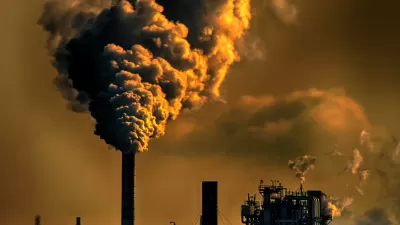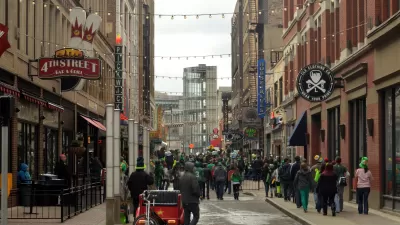Plans to densify a busy Vancouver corridor have prompted concern among public health experts.

In response to plans by the city of Vancouver to add 18,000 new housing units to the high-traffic Cambie corridor over the next 25 years, public health experts discuss the impact of living near high traffic.
CBC spoke to one professor, Michael Brauer, from the University of British Columbia. He noted the benefits of density near transit, but also said that dense residential building in high-traffic areas means more prolonged exposure to air pollution. The emissions, particulates, and even noise caused by traffic can increase rates of lung cancer, heart attacks, and asthma in residents nearby, as well as birth difficulties.
Because the effects of air pollution are so localized—with even a block or two significantly reducing the risks—Brauer proposes mitigating exposure in dense areas by building housing a block or two off the busiest streets and locating retail on the lowest two floors.
FULL STORY: Dense development: is building along busy corridors unhealthy?

Study: Maui’s Plan to Convert Vacation Rentals to Long-Term Housing Could Cause Nearly $1 Billion Economic Loss
The plan would reduce visitor accommodation by 25,% resulting in 1,900 jobs lost.

North Texas Transit Leaders Tout Benefits of TOD for Growing Region
At a summit focused on transit-oriented development, policymakers discussed how North Texas’ expanded light rail system can serve as a tool for economic growth.

Using Old Oil and Gas Wells for Green Energy Storage
Penn State researchers have found that repurposing abandoned oil and gas wells for geothermal-assisted compressed-air energy storage can boost efficiency, reduce environmental risks, and support clean energy and job transitions.

From Blight to Benefit: Early Results From California’s Equitable Cleanup Program
The Equitable Community Revitalization Grant (ECRG) program is reshaping brownfield redevelopment by prioritizing projects in low-income and environmental justice communities, emphasizing equity, transparency, and community benefits.

Planting Relief: Tackling Las Vegas Heat One Tree at a Time
Nevada Plants, a Las Vegas-based nonprofit, is combating the city’s extreme urban heat by giving away trees to residents in underserved neighborhoods, promoting shade, sustainability, and community health.

How Madison’s Tree Planting Efforts Are Growing a Healthier Community
Madison’s annual tree planting initiative is enhancing environmental resilience, public health, and community livability by adding 1,400 carefully selected trees citywide, with strong community and institutional support for urban forestry.
Urban Design for Planners 1: Software Tools
This six-course series explores essential urban design concepts using open source software and equips planners with the tools they need to participate fully in the urban design process.
Planning for Universal Design
Learn the tools for implementing Universal Design in planning regulations.
Ascent Environmental
Borough of Carlisle
Institute for Housing and Urban Development Studies (IHS)
City of Grandview
Harvard GSD Executive Education
Toledo-Lucas County Plan Commissions
Salt Lake City
NYU Wagner Graduate School of Public Service





























